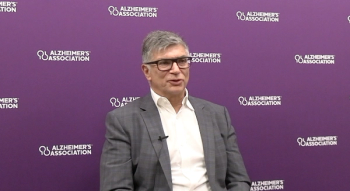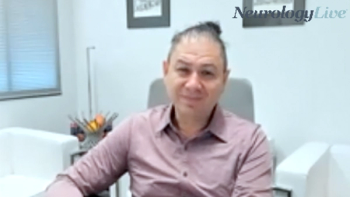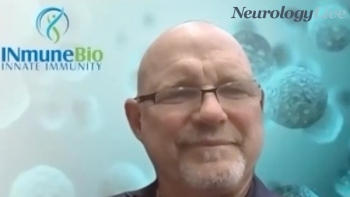
A study recently presented at AAIC 2024 showed that higher consumption of processed red meat significantly increased the risk of dementia and cognitive decline among adults in the United States.

A study recently presented at AAIC 2024 showed that higher consumption of processed red meat significantly increased the risk of dementia and cognitive decline among adults in the United States.

The director of the Brain Health Observatory at the University of Southern California discussed the potential impact of Alzheimer disease blood tests on reducing clinic wait times and improving the diagnostic process in primary care.

The assistant professor at Duke University School of Nursing talked about a project aimed at developing a music-based mobile app to improve sleep for individuals with dementia and their caregivers. [WATCH TIME: 5 minutes]

The co-founder and chief science officer at Longeveron provided commentary on the therapeutic potential of Lomecel-B, a living cell product in development for patients with Alzheimer disease. [WATCH TIME: 3 minutes]

A small clinical trial showed RG6289 dose-dependently altered amyloid-ß monomers in CSF, supporting its development for Alzheimer's disease.

The professor of neuroscience at Imperial College London talked about results from a study assessing a glucagon-like peptide-1 analogue, liraglutide, in patients with Alzheimer disease. [WATCH TIME: 5 minutes]

In Latino individuals, larger household size negatively affects MoCA scores, while higher education positively impacts cognitive outcomes, per SERVE OC trial data.

The chief medical officer at Eisai provided context towards the ongoing initiatives to further the efficacy and safety profile of lecanemab, an FDA-approved treatment for early Alzheimer disease. [WATCH TIME: 3 minutes]

The trial will use phase 2a to determine the optimal dosage while phase 2b will assess efficacy and long-term safety of the optimized dose against a placebo arm.

The drug showed a strong safety profile and met primary endpoints, showing efficacy in slowing clinical and biological decline and supporting further investigation in a phase 2/3 trial.

A duo of experts talked about the association of long-term exposure to fine particulate matter from wildfires and the increased risk of dementia among older adults. [WATCH TIME: 7 minutes]

The vaccine induced a specific humoral immune response, positively affecting several AD-related biomarkers, and showed potential as a treatment for AD, with further trials planned.

The director of the Brain Health Observatory at the University of Southern California talked about integrating blood tests into primary care to better triage patients with Alzheimer disease, reduce unnecessary referrals, and shorten appointment wait times. [WATCH TIME: 7 minutes]

The genetic epidemiologist at the University of Pennsylvania discussed a recent study that highlighted the importance of diverse samples in genetic research for Alzheimer disease in helping to uncover hidden genetic risk factors. [WATCH TIME: 2 minutes]

The professor in the department of internal medicine at RUSH Medical College discussed a study aimed to provide insights to help tailor cognitive decline prevention programs and raise awareness about health disparities in minority populations. [WATCH TIME: 5 minutes]

Adam Naj, PhD, genetic epidemiologist at the University of Pennsylvania, discussed the importance of collecting genetic data from diverse ancestries to investigate the risk of Alzheimer Disease.

The associate professor of neurology at the Indiana University School of Medicine discussed the screening paradigm for Alzheimer disease, and the reluctancy to use new digital tools over traditional methods. [WATCH TIME: 6 minutes]

As a recap from AAIC 2023, get caught up on some of the latest news in neurology as the NeurologyLive® team shares some of our data updates.

A group of experts in the care of patients with neurological conditions—Kumar B. Rajan, PhD; Christina Jensen-Dahm, MD, PhD; Nicole Fowler, PhD; Nicholas Ashton, PhD; Jazmyn Muhammad, BS—shared their perspectives on hot topics of treatment and management in Alzheimer disease from the 2023 Alzheimer's Association International Conference.

The director at the Foundation for the National Institutes of Health discussed relevant biomarkers for Alzheimer disease and their role as novel therapeutics continue to emerge. [WATCH TIME: 5 minutes]

Boris Kantor, PhD, associate research professor of neurobiology, and Ornit Chiba-Falek, PhD, professor in neurology, both faculty at Duke University, discussed research on an innovative epigenome therapy targeting the APOE gene, a significant genetic risk factor for Alzheimer disease.

The director of research for internal medicine and geriatrics at Indiana University School of Medicine discussed the advantages digital assessments bring to clinics, and what role they will play in the coming years. [WATCH TIME: 3 minutes]

Research shows that carrying the APOE e4 variant significantly increases lifetime risk for late-onset Alzheimer disease, and additional evidence suggests that lowering the variant expression may be a promising therapeutic target for the disease.

The associate research professor of neurobiology at Duke University discussed an innovative epigenome editing approach that shows promising prospects for patient improvement, disease prevention, and potential use in Alzheimer disease prophylactic work. [WATCH TIME: 3 minutes]

The chief executive officer at INmune Bio discussed a unique approach from a phase 1 study targeting neuroinflammation in the brain to improve cognitive abilities and maintain memory. [WATCH TIME: 5 minutes]

Maria Carrillo, PhD, chief science officer for the Alzheimer's Association, talked about the release of the updated diagnostic guidelines for Alzheimer disease, which incorporate plasma-based biomarkers.

Results suggest that the high burden of cerebral amyloid angiopathy-related lesions most likely underlies the 30%-60% incidence of amyloid-related imaging abnormalities in APOE e4/4 carriers treated with approved amyloid therapies.

Based on a collection of data from clinical trials in Alzheimer disease, the best way to represent and translate the findings to meaningful benefits is through the use of multiple frameworks.

The chief medical officer at Athira Pharma talked about an exploratory phase 2 trial that showcased the correlation between biomarkers for Alzheimer disease hallmarks and neuroinflammation. [WATCH TIME: 5 minutes]

The director at the Foundation for the National Institutes of Health provided perspective on the effective ways to utilize currently available biomarkers for Alzheimer disease research.